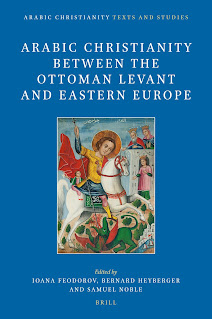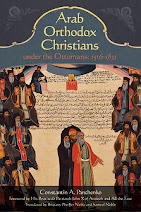Arabic original here.
The Russians, from Amioun to Baskinta: History Repeats Itself
By Pierre Atallah
The delegation from the Russian Imperial Orthodox Society was startled at its arrival in Amioun by the warmth of the reception: Russian and Lebanese flags, groups of scouts, crowds of locals and believers, Byzantine chant, speeches about the friendship between the Russian and Lebanese peoples and the historical connections that bring together the capital of the Orthodox in the time of the Mutasarrifiya-- that is, Amioun-- and Russia. The sentiment was repeated in more than one place where the delegation visited in Lebanese regions accompanied by the secretary of the Orthodox Gathering, Samir Nuayme, whether at Balamand Monastery or Bkerke, Deir Mar Elias Shwayya or Baskinta, whether with the Orthodox Gathering or with the extremist Levant Party, and especially in the social gatherings organized at the Russian embassy. It did not surprise the delegation, which bears the name of the Imperial Russian Society for the Holy Land and the history of whose founding goes back to the czarist era, that some Lebanese still put up pictures of the czars in old Orthodox homes, especially in Koura and Douma, knowing that some of them exchanged them for pictures of Lenin and Stalin during the Soviet era.
The last time that there were Russian monks and ecclesial institutions in Lebanon was on the eve of the outbreak of World War I, when it is said that around 18 Russian monks and ascetics were living in Deir Mar Elias Shwayya near Dhour Choueir. However they left the monastery and Lebanon for fear that the Ottoman Turks would object to their presence. The Russians left behind impressive works of art at the monastery, the most beautiful of which are ancient icons and banners with the double-headed eagle, the emblem of Russia and ancient Byzantium. The Russians-- namely the Imperial Society-- left the schools that they contributing to building across the area in which there were Christians in the 19th century, starting in Bethlehem and Nazareth in Palestine, then South Lebanon in Reshaya al-Foukhar and Reshaya al-Wadi, then to Mount Lebanon and the North in a series of schools that taught hundreds. The Russian Orthodox initiative at that time constituted a response to the Catholic and Protestant missions that were sent by the West to spread its culture and strengthen its influence, and it should be noted that Socialist Russia or the Soviet Union was not stingy in providing educational grants for the instruction of thousands of Lebanese students in its universities and institutes in various fields.
Members of the delegation do not use diplomatic terms to express their positions. They say frankly that their visit is in order to express solidarity with the Christians in general and the Orthodox in particular, that the singing of an agreement of cooperation with the Imperial Society in Amioun is only the beginning, and that the most important thing for them is to become familiar with and to be in contact with the Orthodox civil institutions in Lebanon, be they political, social, or scouting groups. According to the vice-president of the Society, Elena Gabova, "Our hand is extended to all and we desire good for all Lebanese. However, we are concerned with the members of our Orthodox community."
Members of the delegation recount that Russian public opinion is very concerned with what is happening in Syria and the Middle East. In their opinion, Lebanon, Syria and Iraq Russia's backyard and so there is no room for complacency about Islamic extremism dominating these countries. They point to what was announced about fifty thousand Syrian citizens from the Orthodox community signing a petition seeking Russian citizenship and the protection of the Russian state in the event that they are subject to danger. They believe that in this petition there is more than one reason calling on Russian authorities to intervene before the fear of fifty thousand people for their lives. Gabova pointed out that the Society has set up a special office with the name "Center for the Protection of Christians in the Arab East" that is concerned with gathering information about the situations of Christians in the Middle East and monitoring the abuses to which Christians are subjected in these countries. However, the most important thing is that the Society has returned once more to play its cultural role through reopening the Russian Compound School in Bethlehem and working to include programs Russian literature and culture in curricula. Their opinion is that Russia is a rising economic, scientific and military power and that the Russian literary tradition abounds in literary, poetic and scientific masterpieces.
To summarize talking with members of the delegation, there was a lot of clear speaking and messages in a number of directions: "We have returned after over a hundred years and history is repeating itself for the protection of Christians and the confirmation of the Russian presence in the Middle East. Here we are in Lebanon after Bethlehem. Beirut and Damascus are not very far from our borders and we will not permit the domination of al-Qaeda and Islamic extremism over these countries. Let this be clear to all."
The Russians, from Amioun to Baskinta: History Repeats Itself
By Pierre Atallah
The delegation from the Russian Imperial Orthodox Society was startled at its arrival in Amioun by the warmth of the reception: Russian and Lebanese flags, groups of scouts, crowds of locals and believers, Byzantine chant, speeches about the friendship between the Russian and Lebanese peoples and the historical connections that bring together the capital of the Orthodox in the time of the Mutasarrifiya-- that is, Amioun-- and Russia. The sentiment was repeated in more than one place where the delegation visited in Lebanese regions accompanied by the secretary of the Orthodox Gathering, Samir Nuayme, whether at Balamand Monastery or Bkerke, Deir Mar Elias Shwayya or Baskinta, whether with the Orthodox Gathering or with the extremist Levant Party, and especially in the social gatherings organized at the Russian embassy. It did not surprise the delegation, which bears the name of the Imperial Russian Society for the Holy Land and the history of whose founding goes back to the czarist era, that some Lebanese still put up pictures of the czars in old Orthodox homes, especially in Koura and Douma, knowing that some of them exchanged them for pictures of Lenin and Stalin during the Soviet era.
The last time that there were Russian monks and ecclesial institutions in Lebanon was on the eve of the outbreak of World War I, when it is said that around 18 Russian monks and ascetics were living in Deir Mar Elias Shwayya near Dhour Choueir. However they left the monastery and Lebanon for fear that the Ottoman Turks would object to their presence. The Russians left behind impressive works of art at the monastery, the most beautiful of which are ancient icons and banners with the double-headed eagle, the emblem of Russia and ancient Byzantium. The Russians-- namely the Imperial Society-- left the schools that they contributing to building across the area in which there were Christians in the 19th century, starting in Bethlehem and Nazareth in Palestine, then South Lebanon in Reshaya al-Foukhar and Reshaya al-Wadi, then to Mount Lebanon and the North in a series of schools that taught hundreds. The Russian Orthodox initiative at that time constituted a response to the Catholic and Protestant missions that were sent by the West to spread its culture and strengthen its influence, and it should be noted that Socialist Russia or the Soviet Union was not stingy in providing educational grants for the instruction of thousands of Lebanese students in its universities and institutes in various fields.
Members of the delegation do not use diplomatic terms to express their positions. They say frankly that their visit is in order to express solidarity with the Christians in general and the Orthodox in particular, that the singing of an agreement of cooperation with the Imperial Society in Amioun is only the beginning, and that the most important thing for them is to become familiar with and to be in contact with the Orthodox civil institutions in Lebanon, be they political, social, or scouting groups. According to the vice-president of the Society, Elena Gabova, "Our hand is extended to all and we desire good for all Lebanese. However, we are concerned with the members of our Orthodox community."
Members of the delegation recount that Russian public opinion is very concerned with what is happening in Syria and the Middle East. In their opinion, Lebanon, Syria and Iraq Russia's backyard and so there is no room for complacency about Islamic extremism dominating these countries. They point to what was announced about fifty thousand Syrian citizens from the Orthodox community signing a petition seeking Russian citizenship and the protection of the Russian state in the event that they are subject to danger. They believe that in this petition there is more than one reason calling on Russian authorities to intervene before the fear of fifty thousand people for their lives. Gabova pointed out that the Society has set up a special office with the name "Center for the Protection of Christians in the Arab East" that is concerned with gathering information about the situations of Christians in the Middle East and monitoring the abuses to which Christians are subjected in these countries. However, the most important thing is that the Society has returned once more to play its cultural role through reopening the Russian Compound School in Bethlehem and working to include programs Russian literature and culture in curricula. Their opinion is that Russia is a rising economic, scientific and military power and that the Russian literary tradition abounds in literary, poetic and scientific masterpieces.
To summarize talking with members of the delegation, there was a lot of clear speaking and messages in a number of directions: "We have returned after over a hundred years and history is repeating itself for the protection of Christians and the confirmation of the Russian presence in the Middle East. Here we are in Lebanon after Bethlehem. Beirut and Damascus are not very far from our borders and we will not permit the domination of al-Qaeda and Islamic extremism over these countries. Let this be clear to all."








No comments:
Post a Comment